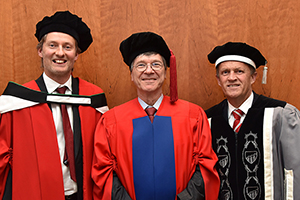Latest News Archive
Please select Category, Year, and then Month to display items
31 December 2019
|
Story Dr Cindé Greyling
|
Photo Anja Aucamp
 Dr Mariana Erasmus, SAENSE Platform Manager, says water remediation is vital for both the ecosystem and industries.
Dr Mariana Erasmus, SAENSE Platform Manager, says water remediation is vital for both the ecosystem and industries.
KovsieInnovation at the UFS supports innovative research outputs in various ways – one of which is to protect the intellectual property and to register patents where viable. This is in line with KovsieInnovation’s broader aim to create third-stream income for the university. Patent registration is a complex process and the UFS is proud to have the needed expertise to properly facilitate such an endeavour.
The SAENSE Platform
South Africa is a water-scarce country, with many water hungry industries (such as agriculture and mining). “Industrial processes often contaminate water with heavy metals, harmful chemicals, radioactive waste, and even organic sludge,” Dr Mariana Erasmus, SAENSE Platform Manager, explains.
Hence, water remediation is vital for both the ecosystem and industries. One of the key functions of the SAENSE Platform is to offer water-remedial solutions for the (bio)remediation of nitrates, heavy metals, and salts, among others. The platform’s activities and services are supported by undergraduate and postgraduate students and researchers, using Technology Innovation Agency (TIA) funding. TIA is a national public entity that serves as key institutional intervention to bridge the innovation chasm between research and development.
From waste to water
Through the joint effort of two mining companies and the UFS/TIA SAENSE Research Platform, a new treatment for mine drainage (MD) has been developed. This patented B-DAS (Barium – Dispersed Alkaline Substrate) technology effectively treats the major contaminants found in acid, alkaline, or neutral mining wastewater. The aim of the B-DAS system is to provide a passive water-treatment solution with minimum waste production; it can also be a potential pre-treatment for reverse osmosis (RO) to lower the requirements of the membranes and therefore potentially reduce the RO cost.
The success of the patent is that it turns unusable water into water that is fit for agricultural purposes at a reduced cost and increased efficiency.
Prof Jeffrey Sachs presented with honorary doctorate at Spring Graduation Ceremony
2015-10-01

Prof Jeffrey Sachs (centre) with Prof Philippe Burger,
Head of Department: Economics (left), and
Prof HJ Kroukamp, Dean of the Faculty of Economic and
Management Sciences (right).
Photo: Charl Devenish |
“Quality education is the best accelerator for sustainable growth. Universities have a unique role to play in this regard,” Prof Jeffrey Sachs said during a lecture he presented at the University of the Free State (UFS) Faculty of Economic and Management Sciences. He gave an insightful overview of the new Sustainable Development Goals (SDGs) of the United Nations. The 17 SDGs replace the Millennium Development goals of the past 15 years. In a major achievement, 193 countries will sign the goals at the United Nations (UN) in New York on 25 September 2015.
Prof Sachs is the director of The Earth Institute, Quetelet professor of Sustainable Development, and professor of Health Policy and Management at Columbia University. He is also a special advisor to the UN Secretary-General Ban Ki-moon on the Millennium Development Goals, and director of the UN Sustainable Development Solutions Network. Another accolade now added to his résumé is an honorary doctorate in Economics conferred on him by the UFS at the Spring Graduation Ceremony on 17 September 2015 for outstanding achievements and contribution to academia.
“South Africa is not achieving sustainable development. It has the highest inequality in the world with high unemployment among the youth. Quality education is the best accelerator for growth,” Prof Sachs said. He used the high education investment in Korea as an example of that country’s growth. Prof Sachs added that the government cannot achieve the SDGs on its own. “It is important for the country and universities to take on the goals. Universities can apply pressure, influence and provide solutions.”